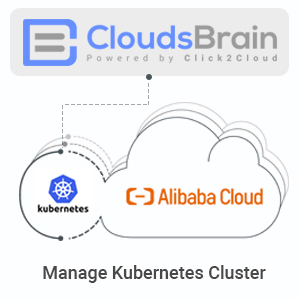


The enterprise is running applications heavily on clouds which contains multiple cloud accounts. These multi-cloud accounts use multiple Kubernetes services provided by different cloud providers.
Managing all the services is a complex task for any end user and that becomes a major challenge for an Enterprise.
Click2Cloud’s CloudsBrain Container feature helps in provisioning of Kubernetes services from different cloud accounts at one place where enterprise can manage Nodes, Deployments, and other resources of Kubernetes.
CloudsBrain Kubernetes cluster helps in managing different Kubernetes services, Container Registries hosted on Alibaba cloud at a single place, which helps in creating and managing different types of Kubernetes services on demand for different clouds.
Fig: Features of Kubernetes
Fig: CloudsBrain Cluster Creation
Kubernetes is an open-source container management tool which automates container deployment, container de-scaling, and container load balancing. The benefits of it is that it works well with all cloud windows with all public, hybrid, and on-premise cloud vendors.
Kubernetes has a huge community because it was first developed by Google and later donated to CNCF.
K8’s can group ‘n’ number of containers into one logical unit for managing and deploying them easily.
Source-to-cluster produces ready-to-run images by inserting source code into a container image and letting the container prepare that source code for execution, and publishes it to user defined Container Registry, and deploys it to the desired Kubernetes Service, which helps to monitor the workflow for build to deployment of application.
Source-to-cluster can containerize the application, by providing just the git source repository, and using Click2Cloud builder images for Python, Perl, Ruby, Node JS, .NET Core 2.0, Legacy .NET and much more.
Create Cluster using CloudsBrain
Fig: Cluster creation using CloudsBrain
Above figure is a dashboard of Kubernetes cluster creation for Alibaba cloud using CloudsBrain.
The first step here is creating the Kubernetes cluster using CloudsBrain. For this, choose the cloud provider. Then get the nodes to join those clusters. Either the pods or containers, everything would be running in nodes.
CloudsBrain helps cloud consumers to create cluster, migrate cluster, deploy, and manage the Kubernetes clusters.
The K8’s masters can only be scheduling or replicating these containers across all these nodes, making sure the configuration satisfied.
There are two ways to access the K8’s master. By UI or by CLI, the CLI is the default way and it is a main way technically because when a user starts to set-up the cluster, they can use CLI and from this user can enable the dashboard. Once the dashboard gets enabled user probably get the GUI and start using K8’s deploying with the help of dashboard.
K8’s Master controls the node and inside nodes there were containers inside them. Containers are inside a separate PODS.
PODS are logical collection of containers which need to interact with each other for an application.
Replication Controller is master’s resource to ensure that requested number of PODS are running on nodes always.
Service is an object on master that provides load balancing across a replicated group of PODS.
This results into:
Fig: Architecture of Kubernetes
Simplify your cloud configuration and automation with the portable and open-source platform ‘Kubernetes’. It manages the containerized workloads seamlessly without disturbing entire infrastructure. This blog gives you an overall idea of what K8’s is and how it works. Alibaba cloud Kubernetes help users to focus on their applications instead of infrastructure management that results in better performance and saves time.
Visit us @www.click2cloud.com for more details on our product and services.